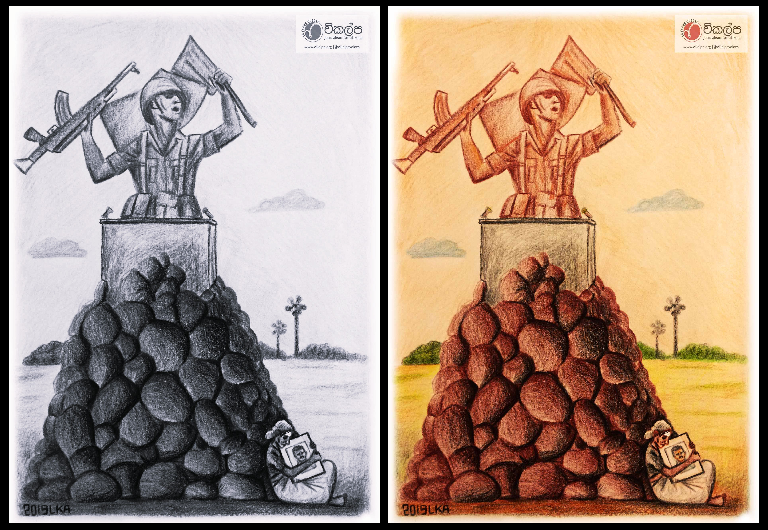Since the end of the 30-year-long armed conflict in Sri Lanka in May 2009, whether it should be celebrated as a victory or allowed to be mourned by the war victims has been a matter of debate almost every year. Since 1949, the government of Sri Lanka and the nationalist forces denied a political demand by the Tamils of the North and East for a degree of autonomy. The national question turned into an armed conflict, later termed ‘separatist terrorism’, and a brutal military solution was found after a decades-long war. The state armed forces, the LTTE, and their various paramilitaries were all responsible for killings, disappearances, torture, and many other abuses during this sordid saga.
The JVP vehemently supported the war effort of the then regimes and security forces, by building the largest ever coalition of the nationalist and chauvinist forces down south.
It now has an enormous responsibility, with its broad front, the NPP, to move the country and the communities towards cohesion, unity, and reconciliation. To build trust in the North, East, and South of the country, the NPP needs to take meaningful and courageous actions rather than just resorting to empty promises..
The North and South are still deeply divided, even to the extent that some in the South do not want to allow the people in the North to mourn their loved ones who were killed during the prolonged, ruthless war. In a country with multiple communities, could one community rejoice while another is mourning?
Those who took part in defeating the armed struggle may feel that they have the right to suppress, prevent, and stop the grieving of the Tamil people. Collective mourning, as demonstrated by the victims of violence during the armed uprisings in the south, should be extended to individuals in the North and East who are still unaware of the date of their friend’s or relative’s death, irrespective of whether they were militants or civilians.
Lots of us are glad that the armed conflict is over. While recognising the right of anyone to celebrate the end of the armed phase of the conflict, we as people need to raise some important questions, at least now. Have the 16 years of war victory celebrations and suppression of commemoration of the war dead among the Tamil people helped achieve unity, reconciliation, and cohesion among diverse communities? How has the suppression of grieving and mourning of the war dead, civilian or militant, bulldozing the graves of their fallen, helped in reuniting the country and generating lasting peace?
The best way to use today’s war victory celebration would be to reinforce the importance of working towards unity, reconciliation and cohesion, by acknowledging the wrongdoings in the past that led to the armed conflict, taking strong and enforceable measures to prevent such wrongs from happening once again and developing enforceable legal mechanisms that will lead towards contributing to the unity, reconciliation and cohesion of our divided communities.
At a War Victory Commemoration, speaking about peace and reconciliation not only involves acknowledging the sacrifices of those who fought, but also recognising the lasting impacts of war and the need for healing and understanding. Moving beyond the celebration, the NPP government needs to reflect on the lessons learned from the conflict and its commitment to a better future free from conflict. It will need to include honouring the fallen, the sacrifices they made, and acknowledging the pain, suffering, and loss experienced by those who fought, their families, and communities.
It is also a time to pause to ‘share in the pain of the defeated’, who thought they had no choice but to take up arms. This involves recognising the human cost involved on all sides, while reflecting on the lasting impact the conflict has had on individuals and society as a whole. The emphasis needs to be on the need for peace, justice, and cooperation in building a better future, and encouraging understanding, forgiveness, and healing between those who may have been adversaries. At the same time, we need to inspire hope and commitment to preventing future conflicts and building a more peaceful country.
On a day like this, we need to acknowledge the complexities of war by recognising that war is not simply a clash of armed forces and groups, but a complex web of human traumas, and many negative experiences and consequences.
The political leaders, in particular, need to understand the significance of inclusive language while avoiding any words that could be interpreted as celebrating victory over the enemy or dehumanising their fallen and glorifying the war. It would be of significance to highlight the human experiences to build a vision for a positive future, a future of resilience, courage, and compassion, and the strength and humanity of all individuals involved.
If we assert that we are working to create a unified country, now is the time for the NPP and its leaders to have the courage and resolve to calm down the highs and lows of victory and defeat, tackle the nationalist tensions in society, and put into action their plan to make “A Beautiful Life and a Thriving Nation”.
The NPP leaders need to inspire action and commitment to creating a future where peace, justice, and reconciliation are prioritised. After all, without encouraging open and honest discussions about the past and without learning from past mistakes, it will be impossible to prevent similar conflicts in the future and engage in the journey towards a cohesive nation.
19 May 2025
